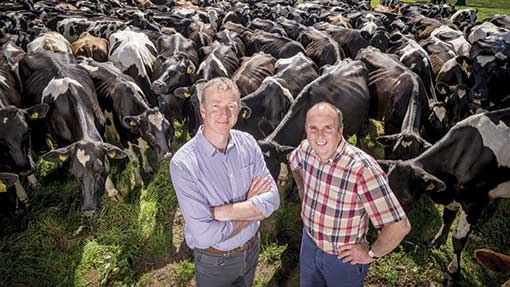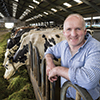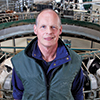Farmers Weekly Dairy Farmers of the Year 2014: Robert Craig and Steve Brandon

Robert Craig and Steve Brandon
Dolphenby Farm, Cumbria
Robert Craig and Steve Brandon have a healthy obsession with grass. Efficiently converting the green stuff into milk solids is the goal of their new joint venture.
They were among the pioneering farmers adopting the New Zealand approach to extended grazing when it gained popularity in the UK more than 10 years ago.
“I was impressed by their absolute focus on a business strategy to deliver a sustainable dairy system based on spring calving and paddock grazing.”
Ian Powell, managing director, The Dairy Group, and independent judge
In the years since, they have honed their systems and are now unlocking the full potential of Cumbrian grass. They took the best bits from their own farms in Cumbria and Shropshire to establish a highly successful dairy farming business in the Eden Valley.
As with all new businesses, having something to sell quickly was essential for early cashflow, and just six months after the tenancy began in October 2011, they had 400 in-calf heifers calving down.
A key decision was to invest £1.2m in the unit, installing a new 20:40 herringbone parlour and dairy, constructing a new collecting yard and upgrading existing cubicle housing. And for the most important crop – grass – they created 50 new grazing paddocks with 5km of new tracks and 13km of water mains.
Another key ingredient for success was finding the right buyer and they succeeded in securing a contract paid purely on milk solids. The farm supplies the Lake District creamery at Aspatria as members of First Milk.
“It works as they are after solids for cheese production,” explains Robert.
Producing high-quality milk is hugely important to them, as shown by the farm winning the creamery’s award for the highest-quality and cleanest milk in their first year.
But what makes them stand out from other dairy farmers is their ability to efficiently convert grass to milk solids. This relies on efficiently grazing for as many days of the year as possible with cows out for nine months. Achieving this requires the right mix of genetics and grass management skills.
Farm facts
- 1,273ha of grassland, including 12ha of spring cereal
- 530 milking cross-bred cows, averaging nearly 5,500 litres, 149 bulling heifers plus 101 heifer calves
- Team of four full-time staff plus three relief milkers
- Grazing for nine months
Winning ways
- Very business focused
- Successful grass-based model
- Good team management and development of the next generation
- Cows and youngstock in excellent condition
One secret to the farm’s success has been Steve and Robert’s ability to identify and develop staff, equipping them with grass management skills.
And they have gone to great lengths actively mentoring and developing the next generation of grassland farmer. They even sent herd manager Mark Housby to New Zealand for three weeks of intensive study to learn how to manage seasonal calving herds.
“While he had extensive dairy knowledge, he had little knowledge of grazing,” says Steve.
The farm also takes on students, with one currently from Harper Adams University College. Robert has a vision of eventually starting a post-graduate scheme developing the next generation of Kiwi-style farmers, learning in New Zealand.
They both recognise the value of hosting visits by students, as well as non-farming groups, such as Friends of the Lake District.
More than 1,000 people have visited Dolphenby since the unit was established three years ago, helping to spread the word on the value of the Kiwi approach to grazing.
Finalists
 Alex Robertson
Alex Robertson
Coopon Carse Farm, Wigtownshire
Alex is successfully managing a high-yielding, 500-cow Holstein herd on an estuary floodplain. Cows are housed all year and he has cut concentrate use by zero grazing grass. He has also seen 33 cows enter the exclusive 100t club.
 Jonathan Wilkinson
Jonathan Wilkinson
Dyffryn Farm, Powys
Faced with a difficult decision to get out or invest and expand, Jonathan opted for the latter and has driven the business forward. He has doubled cow numbers, yields have increased to 9,400 litres and turnover has risen by 50%.
Sponsor’s message
 “Their passion and commitment to the dairy sector, their business and the team around them is so impressive. The determination to develop their people, together with a clear plan for the future, was driving their ambitions.”
“Their passion and commitment to the dairy sector, their business and the team around them is so impressive. The determination to develop their people, together with a clear plan for the future, was driving their ambitions.”
Rachael Chamberlayne, senior product manager – dairy economics
